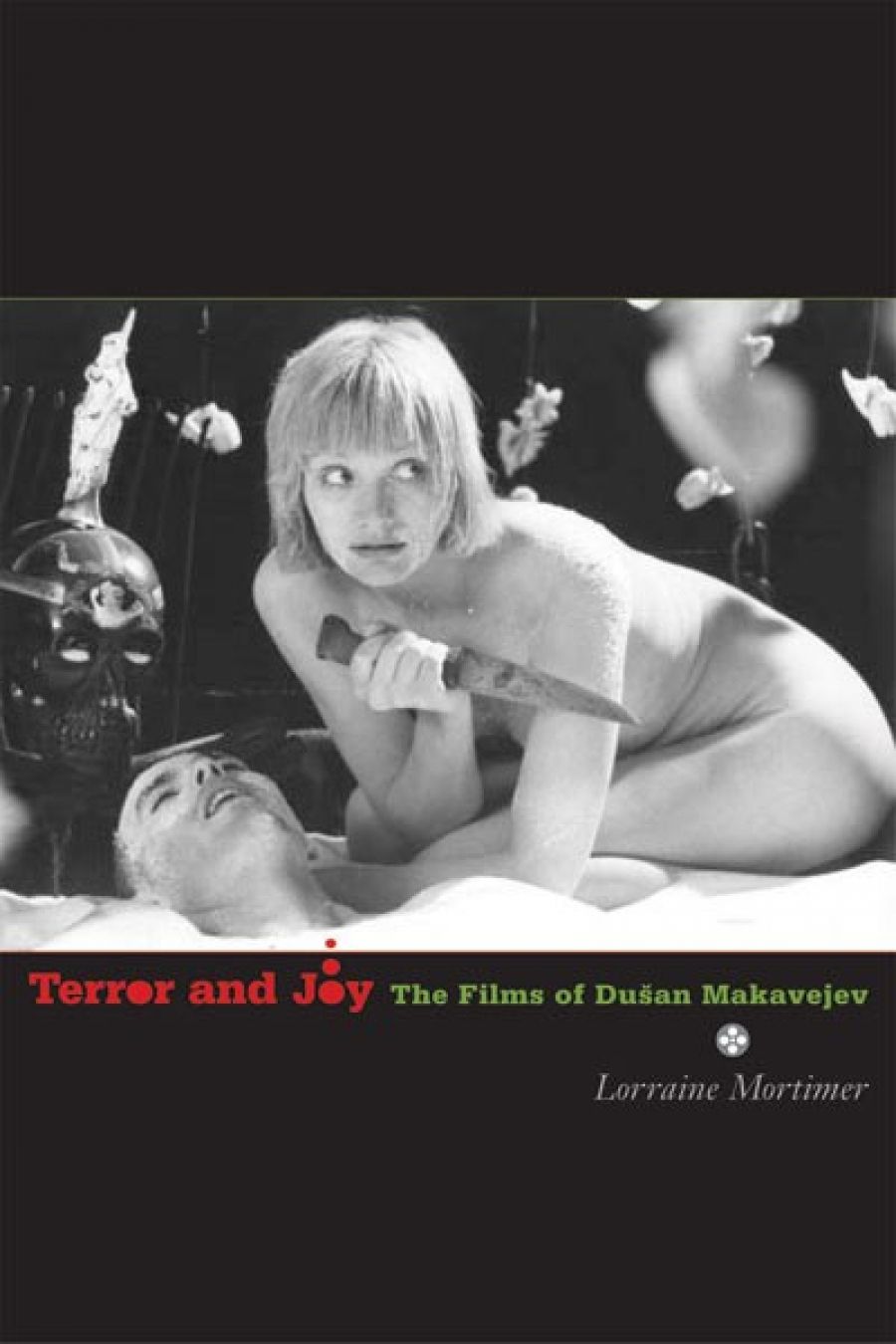
- Free Article: No
- Contents Category: Film
- Custom Article Title: Nick Prescott reviews 'Terror and Joy: The films of Dušan Makavejev' by Lorraine Mortimer
- Review Article: Yes
- Article Title: Revolutionary realms
- Online Only: No
- Custom Highlight Text:
The appearance of an idiosyncratic scholarly text addressing the work of a major European film-maker such as Dušan Makavejev is timely, given our increasingly fraught condition as subjects of a world that becomes more convolutedly politicised with every nanosecond. This is a highly political and indeed humanist analysis of a significant body of cinematic work.
Lorraine Mortimer’s introductory assertion that Makavejev’s 1960s and 1970s work is ‘an international touchstone of radical, transcultural and political cinema’ sets the bar high. Mortimer – an academic at La Trobe University – goes on, in this thoroughly researched and heartfelt study, to set an even more daunting goal for herself, stating that her aim is to examine Makavejev’s films ‘historically, locally, politically and aesthetically, highlighting [no less than] their implications for our understanding of the contemporary world’. This is quite a claim, yet, by and large, Mortimer’s text keeps to its word.
- Book 1 Title: Terror and Joy
- Book 1 Subtitle: The Films of Dušan Makavejev
- Book 1 Biblio: University of Minnesota Press, $44.95 pb, 337 pp
Mortimer, an incisive commentator on cinema and its socio-political contexts, has chosen a film-maker whose very existence has for some years now been hovering on the fringes of Western cultural memory. Makavejev’s crucial work took place during the decades that Mortimer highlights as so significant, and it is curious that, in contrast to other related film-makers such as the celebrated and now Hollywood-friendly Milos Forman, Makavejev’s work has receded from pop culture’s spotlight. Part of Mortimer’s project in this volume is to revitalise interest in Makavejev and his work, and to examine, through a sometimes staggering array of contexts (not just the aforementioned ones but also through contexts including those of ‘magical’, sensual, romantic, transcendent and ‘revolutionary’ realms of thinking), selected works of this controversial film-maker. It might be noted here that Mortimer’s selection of films for concerted analysis is in one way unsatisfying for the Australian cinéaste or scholar, in that the one film Makavejev shot in this country, The Coca-Cola Kid (1985), recently released here on DVD, is one of the films the author chooses not to analyse in depth.
Most twenty-first century cinemagoers in Australia will have had little chance to see Makavejev’s crucial works, much less his more recent films. SBS viewers with long memories might recall the controversy that was caused when David Stratton introduced and aired Makavejev’s still-notorious WR: Mysteries of the Organism in the 1990s, despite the fact that the film was being shown in its less sexually explicit form. This film, central to both Makavejev’s work and to Mortimer’s text, is arguably the quintessential Makavejev film. Produced in 1971 and shot in Makavejev’s native Yugoslavia and the United States, the film directly appropriates psychotherapist/scientist Wilhelm Reich’s theories (both sexual and revolutionary) and makes a fascinating essay on human experience under an array of different cultural, political and social systems.
In a sense, WR: Mysteries of the Organism guides the audience of Mortimer’s study as well, and may help the non-academic reader to access the depth of feeling the author clearly possesses for the film-maker’s work. WR’s politics, Mortimer claims,
cannot be consigned to history […] we are as implicated as we ever were in the violence and tyrannies WR addresses. They are not moments from a past now irrelevant, unable to be detonated. The initial spiel on the title cards about freedom, truth, love and work democracy may sound very ‘sixties’, but the need for these words remains as urgent as ever. They live on as violated possibilities, the validity of our desire for them proven negatively as we have been pushed in the opposite direction.
Terror and Joy (written with the benefit of some input and communication from Makavejev himself) is a genuinely insightful exploration of the crucial part of a distinctive and important film-maker’s oeuvre. As Mortimer asserts in many ways throughout her text, we are living at a stage of human history when difference of all kinds is being erased, with sometimes violent and sometimes beautiful results. All of us can choose to connect, or not, with texts derived from any part of the world in order to attempt to make sense of our own positions within it. This bracing and intelligently conceived work does precisely what it sets out to do: it powerfully argues that political cinema is not dead, indeed never was ill. It had simply been marginalised, for all the wrong reasons. Now it is time to embrace it again.


Comments powered by CComment